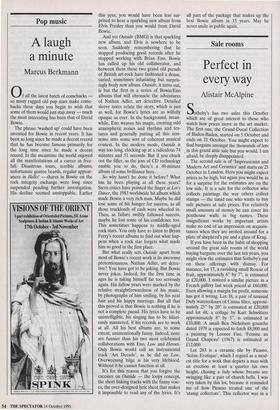Pop music
A laugh a minute
Marcus Berkmann
f all the latest batch of comebacks so many ragged old pop stars make come- backs these days you begin to wish that some of them would just stay away — much the most interesting has been that of David Bowie.
The phrase 'washed up' could have been invented for Bowie in recent years. It has been so long since he made a decent record that he has become famous primarily for the long time since he made a decent record. In the meantime the world enjoyed all the manifestations of a career in free- fall. Disastrous tours, terrible albums, unfortunate goatee beards, regular appear- ances in Hello! — shares in Bowie on the rock integrity exchange were long since suspended pending further investigation. His decline seemed unstoppable. Earlier this year, you would have been less sur- prised to hear a sparkling new album from Elvis Presley than you would from David Bowie.
And yet Outside (BMG) is that sparkling new album, and Elvis is nowhere to be seen. Suddenly remembering that he stopped producing good records after he stopped working with Brian Eno, Bowie has called up his old collaborator, and between them these two grand old pseuds of British art-rock have fashioned a dense, varied, sometimes infuriating but surpris- ingly lively new album. Outside, it turns out, is but the first in a series of Bowie/Eno albums that will chronicle the adventures of Nathan Adler, art detective. Detailed sleeve notes relate the story, which is just as well, for Bowie's lyrics are as wilfully opaque as ever. In the background, mean- while, Eno weaves his magic, creating odd atmospheric noises and rhythms and tex- tures and generally putting all this non- sense into some sort of coherent musical context. In the modern mode, Outside is way too long, clocking up at a ridiculous 74 minutes and 51 seconds. But if you chuck out the filler, as the joys of CD technology enable you to do, there's a 40-minute album of some brilliance here.
So why hasn't he done it before? What has he been playing at all these years? Stern critics have pointed the finger at Let's Dance, the 1983 worldwide hit album which made Bowie a very rich man. Maybe he did lose some of his hunger for success, as all those truckloads of cash were wheeled in. Then, as failure swiftly followed success, maybe he lost some of his confidence too. This sometimes happens to middle-aged rock stars. You only have to listen to Bryan Ferry's recent albums to find out what hap- pens when a rock star forgets what made him so good in the first place.
But what really sets Outside apart from most of Bowie's recent work is its awesome pretentiousness. Nathan Adler, art detec- tive? You have got to be joking. But Bowie never jokes. Indeed, for the first time in ages he is taking himself far too seriously again. His fallow years were marked by the relative straightforwardness of his music, by photographs of him smiling, by his neat hair and his happy marriage. But all that this proved is that Bowie is nothing if he is not a complete pseud. His lyrics have to be unintelligible, his singing has to be hilari- ously mannered, if his records are to work at all. All his best albums are, to some extent, unintentionally funny. Indeed, none are funnier than his two most celebrated collaborations with Eno, Low and Heroes. Only Bowie would call an instrumental track 'Art Decade', as he did on Low. Overweening bilge is his very lifeblood. Without it he cannot function at all.
It's for this reason that you forgive the excesses on Outside — the loopy concept, the short linking tracks with the funny voic- es, the over-designed lyric sheet that makes it impossible to read any of the lyrics. It's all part of the package that makes up the best Bowie album in 15 years. May he never smile in public again.










































































 Previous page
Previous page